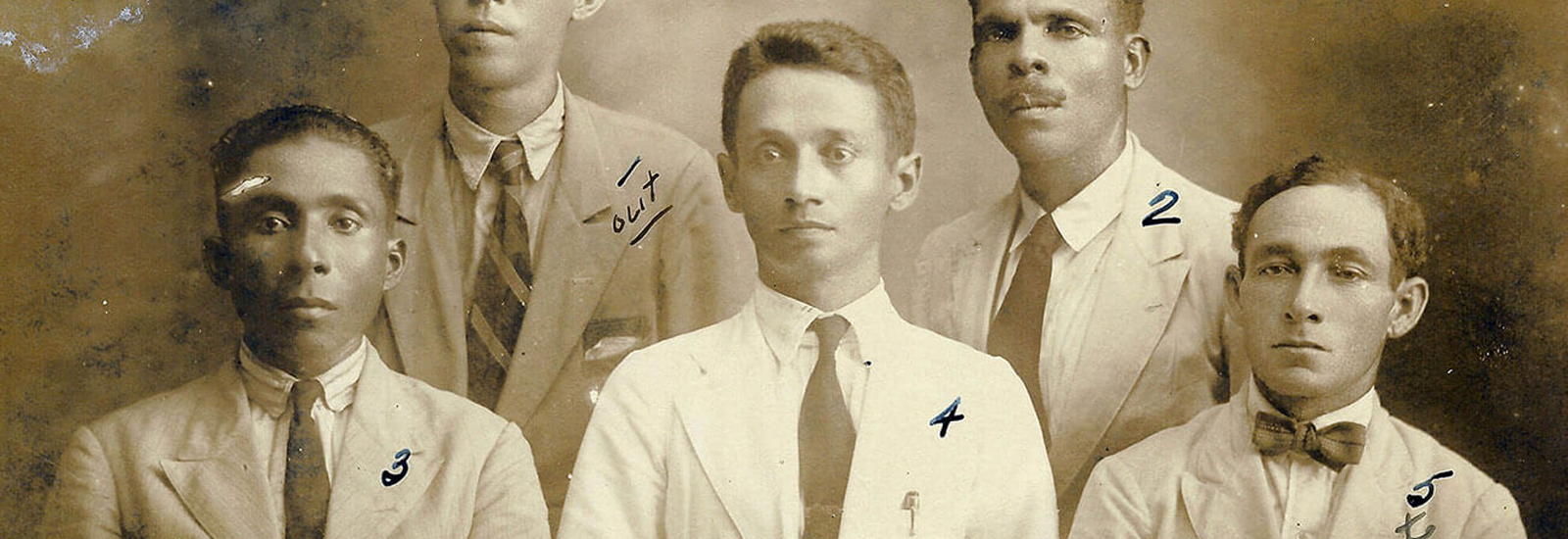
About the Author
EVA SCHERRER (she/her)
Eva Scherrer is an undergraduate fellow in the Global Arts and Humanities' 2021-22 Society of Fellows cohort. She is a third-year student double majoring in history and political science with minors in Spanish and theatre. As an undergraduate research apprentice, Scherrer has studied Latin American history with a focus on labor relations and neocolonialism. She plans on attending graduate school to continue her historical research with the hope of conducting archival work in South America.
Project Overview
The brands we encounter in the grocery store may seem harmless enough, but few are aware of the nefarious pasts associated with these household names. The United Fruit Company, now known as Chiquita Banana, has worked hard to silence the voices of the hundreds of laborers they massacred in 1928, but their stories persist nonetheless. This project seeks to uplift these voices and understand the mechanisms that operated to suppress them.
Defining Informal Imperialism
Informal imperialism involves the imposition of authority through a combination of political and economic channels by a variety of state and non-state actors to achieve political-economic dominance, and the United Fruit Company’s actions in Central and South America are one such instance of informal imperialism. Through specific commercial strategy, the creation of complicated, asymmetrical legal systems, diplomacy with domestic and foreign governments, and the repression of labor organization, the United Fruit Company created an informal empire in Colombia.
“We were reclaiming a just salary and living conditions that were adjusted to our needs, and United and Cortés Vargas gave us bullets, murdered us, and brought martial law.” / “Nosotros reclamábamos un salario justo y unas condiciones de vida que se ajustaran a nuestras necesidades, y la United y Cortés Vargas nos dieron plomo, nos asesinaron y nos llevaron a consejos de guerra.”
CARLOS VANEGAS, striker
The Unionizing Effort
Workers chafed under the burden of this empire with its oppressive legal systems and harsh working conditions, prompting efforts for unionization. In 1928, after forming an official strike committee to coordinate the workers’ efforts, the newly-formed Unión Sindical de Trabajadores del Magdalena (USTM) submitted a pliego de peticiones detailing their demands, including:
- Collective insurance
- Indemnification for work-related accidents
- Hygienic dwelling places and one day of rest every week
- A 50% increase for lower-paid workers
- Discontinuance of the company’s commissaries
- Elimination of the use of credit slips in place of money
- Weekly rather than biweekly payments
- Replacement of subcontractors with direct contracts with the company
- Establishment of hospitals in sufficient number and the proper sanitation of camps
The organization of workers threatened to cause serious issues for production which could result in great profit loss, so UFCO opted to employ its imperial capabilities and repress labor, utilizing surveillance and force to subdue the unions. Despite such efforts to derail the union’s endeavors, the workers persisted. After months of constant effort to seek an audience with UFCO higher-ups, manager Thomas Bradshaw finally agreed to meet with USTM representatives on November 10, 1928 but ignored them at the bargaining table. The strike was launched the next day. Work on United Fruit Company plantations was stalled in a peaceful manner, but the Colombian government nonetheless summoned the military on behalf of the company.
The Massacre
According to striker Sixto Ospino Nuñez, the government instructed the army to gather the demonstrators in Cienaga’s central plaza, offering the impression that he intended to discuss their petition. Nuñez conveyed the strikers’ hope for reconciliation: “The people firmly believed that the army wouldn’t fire and the governor would arrive.” However, such hopes would not come to fruition, and General Cortes Vargas announced to the gathered protesters that the decree “declared the strikers to be a ‘bunch of hoodlums’ and authorized the army to shoot to kill.” Soldiers ordered the crowd to disperse, and when they refused, the military shot into the crowd indiscriminately, “firing without cease.”
“The military fired against everyone anywhere without even asking what someone was doing. [...] That’s why bodies were found everywhere” / “El ejército disparaba contra todo el mundo en cualquier parte, sin preguntar siquiera qué estaba haciendo. [...] Por eso fue que se encontraban cadáveres por todos partes.”
SIXTO OPINO NUÑEZ, striker
Violence continued through the night and for the next few days that followed with the goal of eliminating all remaining union leaders after the initial massacre. Nuñez recounted the haphazardness of the soldiers, stating that “the military fired against everyone anywhere without even asking what someone was doing. [...] That’s why bodies were found everywhere.” Accounts of how many people were killed in this period of time vary widely with some official sources putting the number as low as nine, while author Gabriel García Márquez placed it around 3000. Following the massacre, the dead were gathered and taken to the sea to be disposed of. Márquez described this phenomenon, noting that “those who had put them in the car had time to pile them up in the same way in which they transported bunches of bananas.” His juxtaposition of the dead strikers and the bananas frames both as assets to a company that were manipulated and controlled in the search for profit.
“Look at the mess we’ve got ourselves into [...] just because we invited a gringo to eat some bananas.”
GABRIEL GARCÍA MÁRQUEZ
Profits Over People
For UFCO, the workers they employed and the conditions they existed in were not of relevance unless they were somehow threatening the company’s bottom line. Only when their organization jeopardized the company’s well-being were they an important consideration, and even then, their humanity was disregarded to find an easy solution to a difficult problem. UFCO clearly felt the need to control its workers to the utmost degree, so when the workers endangered that authority, UFCO did not hesitate to use deadly force to extinguish resistance and maintain control. This exercise of dominance, once again, displays the imperial nature of UFCO’s operations in Colombia.
Primary Sources
- Arango Zuluaga, Carlos. Sobrevivientes De Las Bananeras. Colombia: Editorial Colombia Nueva, 1981.
- Arthur A. Pollan. Letter to Banana Division Managers. In One Hundred Years of United Fruit Company Letters, by Philippe Bourgois. Boston, Massachusetts, November 15, 1929.
- Caffery, Jefferson. Telegram to Frank B. Kellogg. Bogotá, Colombia, December 5, 1928.
- Caffery, Jefferson. Telegram to Frank B. Kellogg. Bogotá, Colombia, December 6, 1928.
- Caffery, Jefferson. Telegram to Frank B. Kellogg. Bogotá, Colombia, December 29, 1928.
- Caffery, Jefferson. Telegram to Frank B. Kellogg. Bogotá, Colombia, January 16, 1929.
- Caffery, Jefferson. Telegram to Frank B. Kellogg. Bogotá, Colombia, August 1, 1929.
- Kellogg, Frank B. Telegram to Jefferson Caffery. Washington, DC, December 8, 1928.
- Kyes, J.M. Letter to E.C. McFarland. In One Hundred Years of United Fruit Company Letters, by Philippe Bourgois. Panama City, Panama, January 17, 1919.
- Letter to H. S. Blair. In One Hundred Years of United Fruit Company Letters, by Philippe Bourgois. Bocas del Toro, Panama, April 16, 1920.
- Márquez, Gabriel García. One Hundred Years of Solitude. Translated by Gregory Rabassa. New York, NY: HarperCollins, 1970.
- United Fruit Company. “Memorandum, Colombian Division.” Bogotá, Colombia, March 8, 1929.
Secondary Sources
- Bourgois, Philippe. “One Hundred Years of United Fruit Company Letters.” In Banana Wars: Power, Production, and History in the Americas, edited by Steve Striffler and Mark Moberg, 103–44. Duke University Press, 2003.
- Bucheli, Marcelo. Bananas and Business: The United Fruit Company in Colombia, 1899-2000. New York, NY: New York University Press, 2005.
- Bucheli, Marcelo. “Enforcing Business Contracts in South America: The United Fruit Company and Colombian Banana Planters in the Twentieth Century.” The Business History Review 78, no. 2 (2004): 181–212.
- Bucheli, Marcelo, and Min-Young Kim. “Political Institutional Change, Obsolescing Legitimacy, and Multinational Corporations: The Case of the Central American Banana Industry.” MIR: Management International Review 52, no. 6 (2012): 847–877.
- Coleman, Kevin. “The Photos That We Don't Get To See: Sovereignties, Archives, and the 1928 Massacre of Banana Workers in Colombia.” Essay. In Making the Empire Work: Labor and United States Imperialism, edited by Daniel E. Bender and Jana K. Lipman, 104–34. New York, NY: New York University Press, 2015.
- Howe, Stephen. Empire: A Very Short Introduction. Oxford: Oxford Univ. Press, 2010.
- Joseph, Gilbert M. “Close Encounters: Toward a New Cultural History of U.S.-Latin American Relations.” In Close Encounters of Empire: Writing the Cultural History of U.S.-Latin American Relations, edited by Gilbert M. Joseph, Catherine C. LeGrand, and Ricardo D. Salvatore, 3–46. Durham, NC: Duke University Press, 1998.
- Kepner, Charles David, and Jay Henry Soothill. The Banana Empire: A Case Study of Economic Imperialism. New York, NY: Russell & Russell, 1967.
- LeGrand, Catherine C. “Living in Macondo: Economy and Culture in a United Fruit Company Banana Enclave (Santa Marta, Colombia, 1890-1930).” In Close Encounters of Empire: Writing the Cultural History of U.S.-Latin American Relations, edited by Gilbert M. Joseph, Catherine C. LeGrand, and Ricardo D. Salvatore, 333–368. Durham, NC: Duke University Press, 1998.
- Lenin, Vladimir Ilyich. “Imperialism, the Highest Stage of Capitalism.” In European Imperialism, 1830-1930: Climax and Contradiction, by Alice L. Conklin and Ian Christopher Fletcher, 36–43. Boston, MA: Houghton Mifflin, 1999.
- Luxemburg, Rosa. “Capitalism Depends on the Non-Capitalist World.” In European Imperialism, 1830-1930: Climax and Contradiction, by Alice L. Conklin and Ian Christopher Fletcher, 29–36. Boston, MA: Houghton Mifflin, 1999.
- “Take Action: Demand Justice for Jorge Alberto Acosta!” The Action Network. Accessed December 7, 2021.
- Shahbandeh, Melissa. “Most Consumed Fruits in the United States in 2020.” Statista, April 27, 2021.
- "United Fruit Company." History of World Trade Since 1450. Encyclopedia.com, November 24, 2021.

